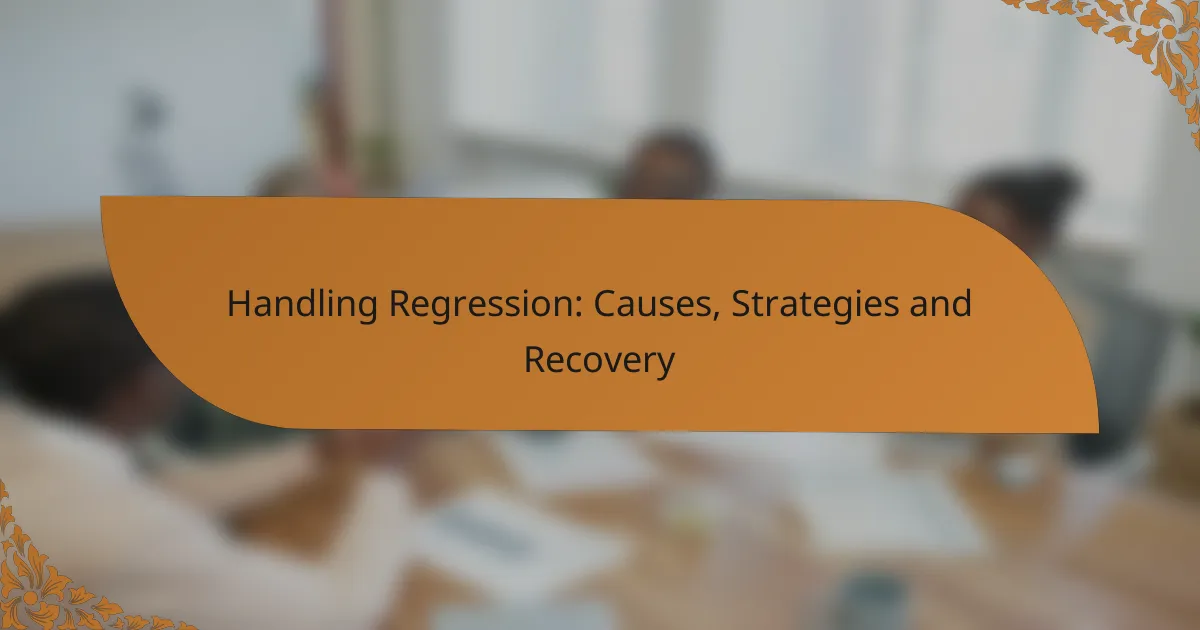Regression can significantly hinder progress and performance, often stemming from various underlying factors. By understanding these causes, individuals and organizations can develop effective strategies for recovery, focusing on proactive measures such as regular evaluations and clear goal setting. A structured approach to recovery not only addresses the root issues but also fosters sustainable progress moving forward.

What are the causes of regression?
Regression can occur due to a variety of factors that disrupt progress or performance. Understanding these causes is essential for identifying effective strategies for recovery and improvement.
Environmental factors
Environmental factors include changes in surroundings that can impact behavior and performance. For instance, a noisy or chaotic workspace may hinder concentration and productivity.
Consider the impact of physical space, such as inadequate lighting or uncomfortable seating, which can lead to decreased motivation and focus. Regularly assess your environment to ensure it supports your goals.
Psychological triggers
Psychological triggers can stem from stress, anxiety, or negative self-talk, which may lead to regression in performance. These mental barriers can create a cycle of doubt that undermines confidence and ability.
To combat this, practice mindfulness or cognitive-behavioral techniques to reframe negative thoughts. Engaging in positive self-affirmations can also help build resilience against psychological setbacks.
Health issues
Health issues, including chronic illnesses or mental health conditions, can significantly affect performance and lead to regression. Fatigue, pain, or emotional distress can diminish focus and productivity.
Prioritize self-care and seek medical advice if health problems persist. Regular exercise, a balanced diet, and adequate sleep are essential for maintaining overall well-being and performance levels.
Skill decay
Skill decay occurs when skills are not practiced or utilized regularly, leading to a decline in proficiency. This is common in fields that require continuous learning and application of knowledge.
To prevent skill decay, schedule regular practice sessions or engage in ongoing education. Consider joining workshops or online courses to keep skills sharp and relevant.
External stressors
External stressors, such as financial difficulties or personal relationships, can create distractions that hinder performance. These stressors can lead to a lack of focus and motivation, resulting in regression.
Identify and address these stressors by developing coping strategies, such as time management techniques or seeking support from friends and family. Creating a stable support system can help mitigate the impact of external pressures on performance.

What strategies can help prevent regression?
To prevent regression, implementing proactive strategies is essential. These strategies focus on regular evaluations, consistent practice, robust support systems, and clear goal setting to maintain progress and mitigate setbacks.
Regular assessments
Conducting regular assessments is crucial for identifying potential regression early. These evaluations can take the form of self-assessments, peer reviews, or formal testing, depending on the context.
For example, in educational settings, quizzes or progress checks every few weeks can help gauge understanding and retention. In professional environments, performance reviews can highlight areas needing attention.
Consistent practice
Consistent practice reinforces skills and knowledge, making regression less likely. Establishing a routine that incorporates regular practice sessions helps solidify learning and maintain momentum.
For instance, dedicating a specific time each day for skill development, whether through exercises, simulations, or real-world applications, can lead to significant improvements over time. Aim for daily or weekly practice, depending on the complexity of the skill.
Support systems
Having a strong support system can greatly reduce the chances of regression. This can include mentors, peers, or professional networks that provide encouragement and accountability.
Engaging with a community, whether online or in-person, fosters a sense of belonging and motivation. Regular check-ins with a mentor or study group can help keep individuals focused and on track.
Goal setting
Effective goal setting is a key strategy in preventing regression. Setting clear, achievable goals provides direction and motivation, making it easier to track progress.
Utilize the SMART criteria—Specific, Measurable, Achievable, Relevant, Time-bound—to formulate goals. For example, instead of a vague goal like “improve skills,” specify “complete three online courses in the next two months.” This clarity helps maintain focus and reduces the likelihood of setbacks.

How can you recover from regression?
Recovering from regression involves identifying the underlying issues, gradually re-engaging with the process, and utilizing available resources effectively. A structured approach can help mitigate setbacks and foster sustainable progress.
Identify root causes
Understanding the root causes of regression is essential for effective recovery. Common factors include lack of motivation, insufficient support, or external stressors. Conducting a self-assessment or seeking feedback can help pinpoint specific triggers.
Consider keeping a journal to track patterns and emotions associated with regression. This can reveal insights into when and why setbacks occur, allowing for targeted interventions.
Implement gradual re-engagement
Gradual re-engagement helps ease the transition back into a productive routine. Start with small, manageable tasks that can build confidence and momentum. For example, if you are returning to a workout regimen, begin with shorter sessions before increasing intensity.
Establish a schedule that incorporates regular check-ins to assess progress and adjust goals as necessary. This approach fosters a sense of achievement and reduces the risk of overwhelming yourself.
Seek professional guidance
Professional guidance can provide valuable insights and strategies for overcoming regression. Consider consulting with a coach, therapist, or mentor who specializes in your area of concern. They can offer tailored advice and accountability.
Look for professionals with relevant experience and credentials. Engaging in group sessions or workshops can also provide support and motivation from peers facing similar challenges.
Utilize recovery tools
Recovery tools can enhance your efforts to overcome regression. These may include apps for tracking progress, online communities for support, or resources like books and courses that offer strategies for improvement. Choose tools that align with your personal goals and preferences.
For instance, productivity apps can help manage tasks and set reminders, while mindfulness apps can assist in reducing stress. Experiment with different tools to find what works best for you, and be open to adjusting your approach as needed.

What role does motivation play in handling regression?
Motivation is crucial in managing regression as it drives individuals to persist through challenges and setbacks. A strong sense of motivation can help maintain focus and commitment, making it easier to navigate obstacles and achieve recovery.
Intrinsic motivation
Intrinsic motivation refers to the internal drive to engage in an activity for its own sake, rather than for external rewards. This type of motivation fosters a deeper connection to goals and can enhance resilience during regression. For example, someone passionate about fitness may continue to exercise even after a setback because they enjoy the process and the personal growth it brings.
To cultivate intrinsic motivation, individuals can reflect on their personal values and interests. Setting personal challenges that align with these values can reinforce commitment and enjoyment, making it easier to overcome regression.
Extrinsic motivation
Extrinsic motivation involves external factors that encourage behavior, such as rewards or recognition. While this can be effective in the short term, relying solely on extrinsic motivators may lead to burnout or disengagement over time. For instance, a person might initially work hard to achieve a promotion but may lose interest if the reward feels unattainable or unfulfilling.
To effectively use extrinsic motivation, it’s important to combine it with intrinsic factors. Setting up a system of rewards that acknowledges progress can help maintain momentum, but should be balanced with personal satisfaction to ensure long-term engagement.
Setting achievable milestones
Setting achievable milestones is essential for maintaining motivation during regression. Breaking larger goals into smaller, manageable tasks can provide a sense of accomplishment and keep individuals focused on their progress. For example, if someone is working on a fitness goal, they might set weekly targets for workouts or dietary changes.
When establishing milestones, it’s important to ensure they are realistic and time-bound. Regularly reviewing and adjusting these milestones can help individuals stay motivated and adapt to any challenges that arise, ultimately supporting their recovery journey.

How can community support aid in recovery?
Community support plays a crucial role in recovery by providing emotional backing, practical assistance, and a sense of belonging. Engaging with others who share similar experiences can enhance motivation and resilience during challenging times.
Peer encouragement
Peer encouragement fosters a supportive environment where individuals can share their struggles and successes. This mutual support can lead to increased accountability and motivation, as members inspire each other to stay committed to their recovery goals.
For example, regular check-ins or motivational messages among peers can help maintain focus and positivity. Establishing a buddy system, where individuals pair up to support one another, can also be effective in reinforcing commitment to recovery efforts.
Group activities
Participating in group activities can enhance social connections and provide a sense of community. Activities such as workshops, exercise classes, or support groups create opportunities for individuals to engage with others while focusing on their recovery.
Consider joining local support groups that offer structured activities, which can range from art therapy to outdoor adventures. These group settings not only promote healing but also help individuals develop new skills and interests, making recovery a more enjoyable process.
